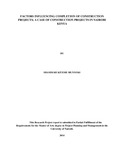| dc.description.abstract | This research study sought to identify factors influencing completion of construction projects.
The research objectives were; to determine how contract duration influences completion of
construction projects, to investigate whether project financing influences completion of
construction projects in Nairobi, to examine how planning influences completion of small
construction projects in Nairobi, to find out how supervision/inspection of work influences
completion of construction projects in Nairobi, to assess how the type of project delivery chosen
influences completion of construction projects in Nairobi. The research questions were; how
does the construction contract duration influence completion of construction projects in Nairobi?
How does project financing influence completion of construction projects in Nairobi? How
does planning influence completion of construction projects in Nairobi? How does
supervision/inspection of work influence completion of construction projects in Nairobi? How
does the type of project delivery method chosen influence completion of construction projects in
Nairobi? The research design was a descriptive and explorative or correlative. This is because it
sought to discover the relationship between aspects of a problem. A survey questionnaire was
applied in the study. The sample population includes architects, quantity surveyors, structural
engineers, civil engineers, mechanical engineers, electrical engineers, land surveyors
construction project managers and private developers. The sample size is 77 respondents, and the
non-probability sampling technique used in the study is purposive/judgmental and snow-balling.
The questionnaire was the data collection instrument used in the study. The validity test methods
employed were expert review, face, content, sampling and construct validity tests while the tools
used to verify the reliability of the tool is cronbach’s alpha. Data analysis techniques used were
descriptive statistics, inferential statistics used is Karl Pearson’s as well as Spearman’s
correlation factors while regression analysis was applied to identify a mathematical relationship
between variables. A likert scale was also used. The findings showed that project cost increased
with an average of 13.5% while project duration increased by 33.6%. 98% of respondents
believe project financing and inspection/supervision influence completion of construction
projects. 73% and 71% respectively gave the information that construction contract duration and
project delivery type chosen respectively influence completion of construction projects. 100% of
the respondents believe project planning at all stages influences completion of construction
projects. The majority respondents said EPC/Turnkey projects are the most successful in
ensuring project completion though the type of project delivery chosen may vary for various
reasons. The recommendations include project managers need to engage project stakeholders all
through project lifetime. Competent project managers should be involved in projects while
clients should provide adequate project financing. Contractors should not have cash flow
problems and project teams should be trained on project success factors. A quality culture in
construction industry should be encouraged. Every stakeholder in construction projects
implementation should be sensitized on the reality that projects will most likely suffer delay in
contract duration and definitely increase in project costs. Efforts should be collectively made to
manage this in a way that clients don’t suffer consequences of projects not being completed in
time, budget and to meet the design scope and quality | en_US |

